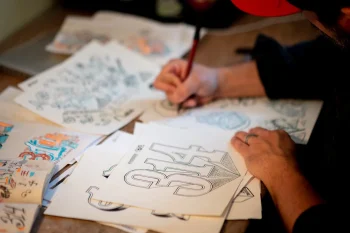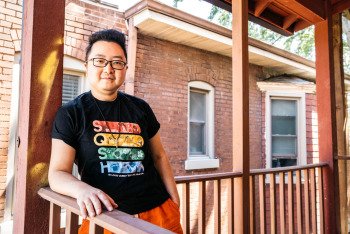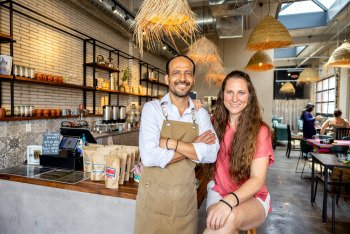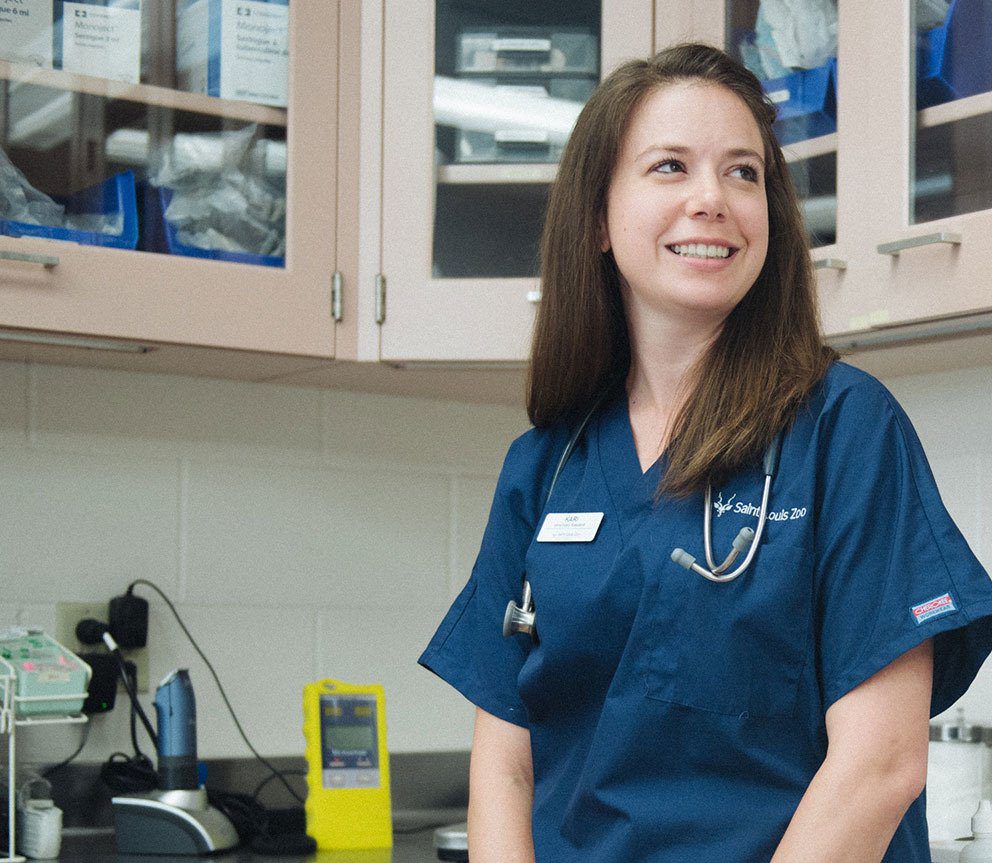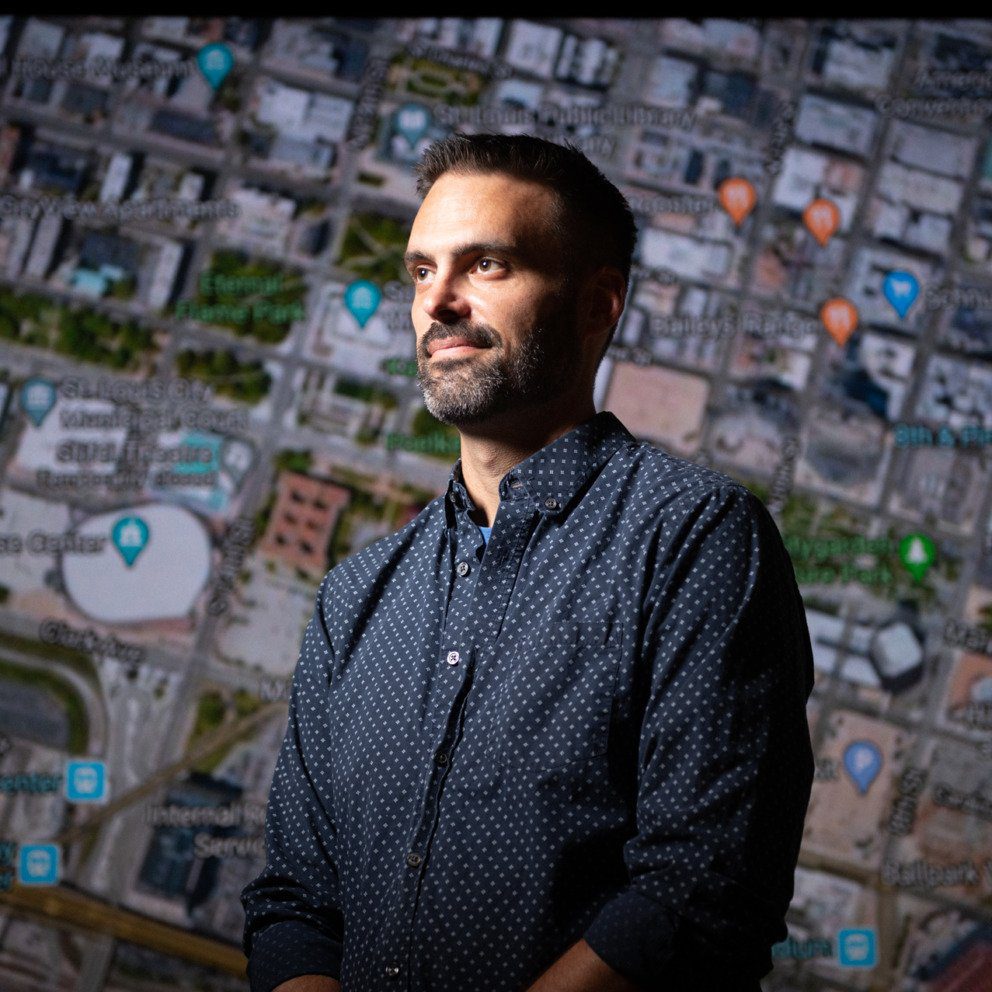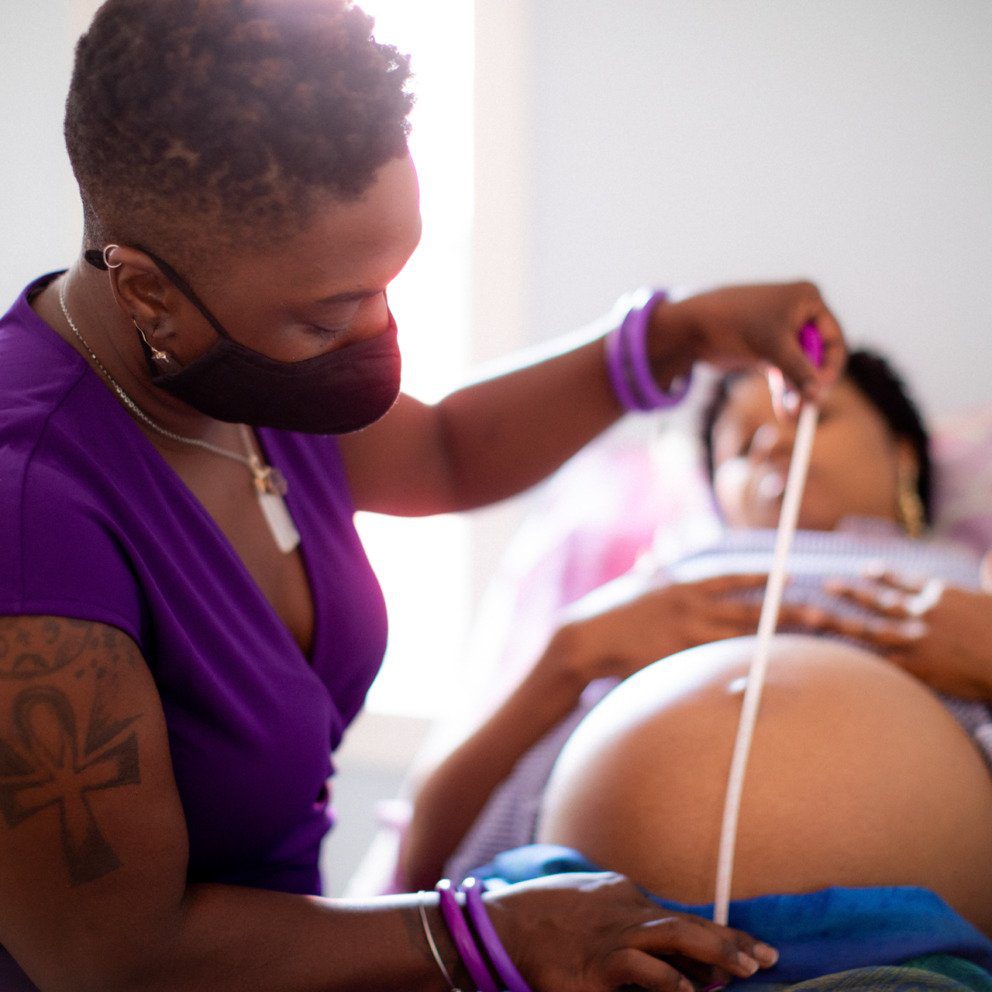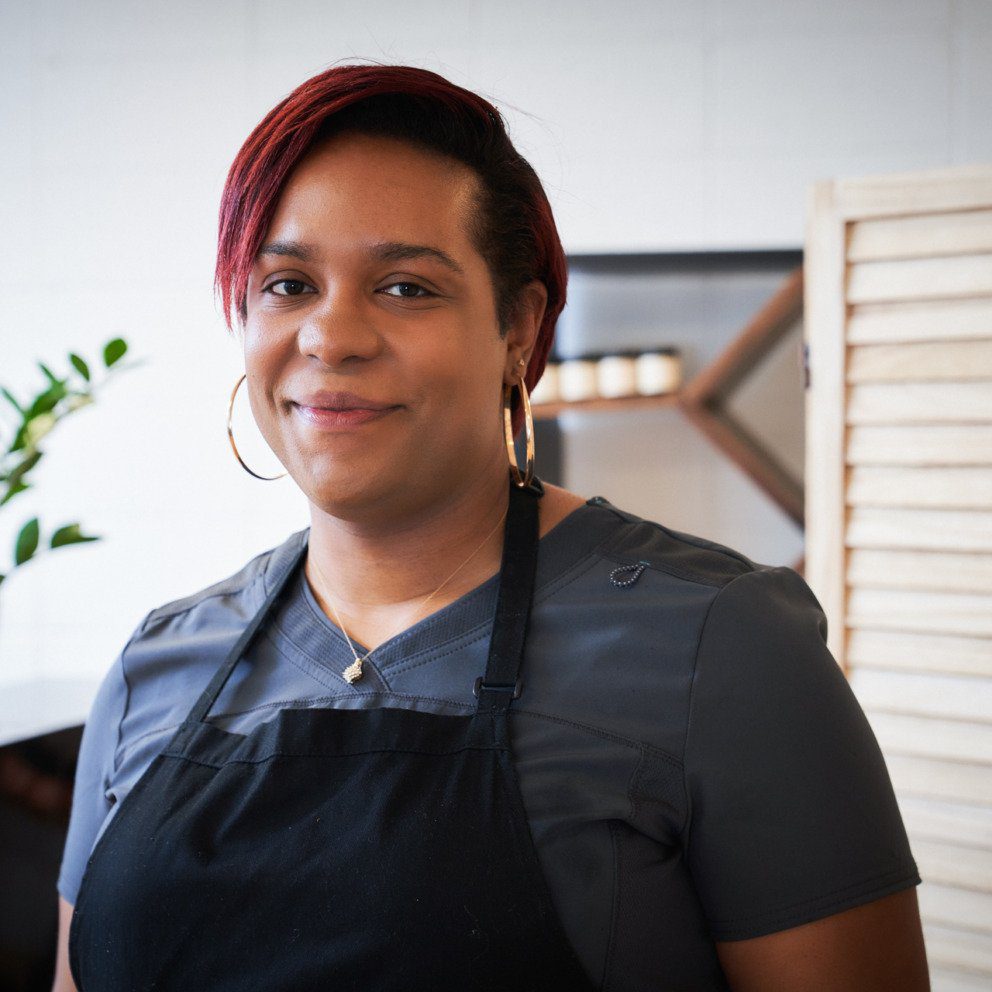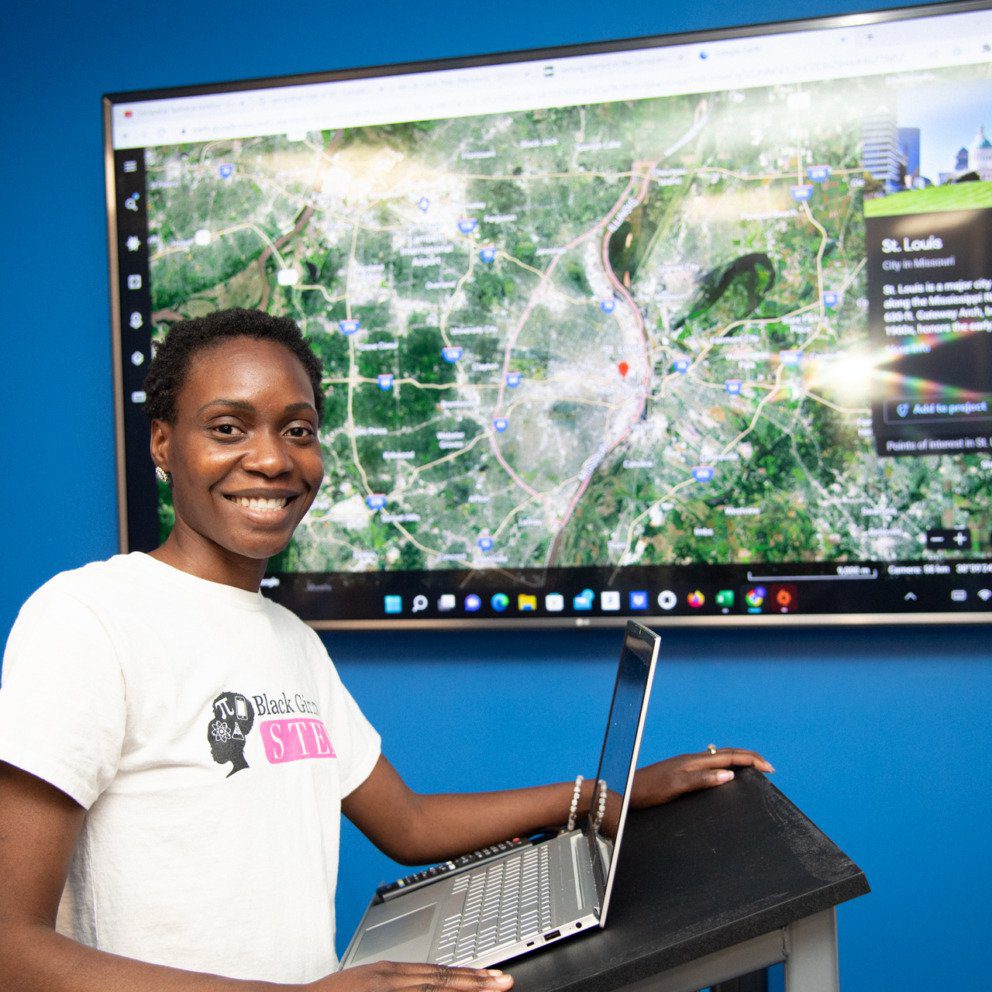Life-Saving Science
Dr. Sarah George and other researchers at Saint Louis University School of Medicine’s Center for Vaccine Development are leading national efforts to find treatments for a wide range of infectious diseases that pose an ever-growing threat.
More than two years after the onset of COVID-19, most people in St. Louis and around the globe are eager to move on with their lives.
For Dr. Sarah George, associate professor of infectious diseases, allergy and immunology at the SLU Center for Vaccine Development — one of only nine federally funded Vaccine and Treatment Evaluation Units in the United States — the COVID-19 virus is just another pathogen amid a large and complex web of disease-spreading microbes, whose eventual elimination has been the focus of her daily working life for nearly two decades.
“Coronaviruses are going to haunt us for a long time,” George says. “They’re all over in nature, and they have a real propensity to jump to humans, as we have found.” Thankfully, however, vaccine development has also come a long way, led in large part by the SLU center, which is currently leading clinical trials for a host of diseases, including COVID-19, yellow fever, chikungunya and others.
The goal of this research is simple, George says: to save lives and prevent human suffering. And this was accomplished, at least in part, with the COVID-19 vaccines.
“As bad as COVID-19 was — it killed a million people in this country and who knows how many millions worldwide — had it not been for vaccines, it would have been infinitely worse,” says George. (According to the latest aggregate online data, approximately 1 million people have died of COVID-19 in the U.S., while 6.44 million people have died worldwide.)
As climate change escalates, scientists predict that coronaviruses and other infectious diseases will become more prevalent around the world, as reported by ProPublica and National Geographic. George cites recent flash flooding as a more immediate example, a phenomenon that has been linked to climate change by many experts. “With horrendous downpours like we’ve had in St. Louis only too recently, it’s indirect, but floods are just filthy,” she says. “In poorer countries, flooding leads to outbreaks of cholera and a lot of nasty water-borne diseases. Even here, you can start seeing outbreaks of skin and leg infections from people being in dirty water.”
While the outlook may seem grim and the challenges daunting, George finds hope in the power of scientific research. Her work on dengue, another mosquito-borne virus that is a leading cause of illness and death in some Asian and Latin American countries (and that also occurred in Florida this summer), is a case in point.
“We did the first human study of the dengue vaccine, which is probably going to be the first one licensed in Europe in the fairly near future,” she says. “It has real promise to offer significant protection. Once it gets licensed it will probably be used for our troops who are deployed in dengue-endemic areas, which is a large part of the world.”
Even COVID-19, with all the suffering and chaos it has caused, has inspired advancements in vaccine development with the use of mRNA technology, George says. These types of vaccines take a different approach to triggering the body’s immune response. Instead of using a weakened or inactivated germ, mRNA vaccines rely on a synthetic molecule created in a laboratory, which then catalyzes the immune system by teaching cells to make a certain protein.
“The COVID vaccines were the first vaccines to use mRNA that was licensed, and they’ve been extremely successful. So now a lot of companies are adapting mRNA vaccine technology,” she says. The SLU center is currently leading an mRNA vaccine trial for respiratory syncytial virus, a disease that often incurs symptoms of the common cold but can pose serious health problems for infants and older adults.
The center will also start an mRNA influenza vaccine trial at the end of September. This effort will target a seasonal strand of influenza, but George explains that various concepts for a universal flu vaccine are also undergoing development, which she describes as “the holy grail of flu vaccine work.” In general, there is a strong need for better flu vaccine technology, according to George, who notes that a new flu pandemic arises every 15 to 25 years, on average.
“The way we make the flu shot every single year is by growing it in chicken eggs,” she says. “So we need hundreds of millions of embyronated chicken eggs to make the vaccine. It’s really primitive technology. If we could make it with something synthetic like mRNA, that would be a big advance right there.”
This power to change lives was what initially drew George to the field of infectious disease in the mid-1990s, as she witnessed formerly terminal HIV patients regain their ability to function. “Before the first treatments for HIV, patients were basically going to die,” she says. “Once the first effective treatments came out, you saw people who were literally close to death’s door become healthy working members of society again. That was a wonderful thing to see.”
Over the years, George has focused intensively on microbes transmitted by mosquitoes. She currently has vaccine trials underway for yellow fever and chikungunya, two diseases in which a mosquito bite triggers fever, body aches and other unpleasant symptoms. At the moment, both diseases disproportionately affect the world’s poorest populations in tropical and subtropical areas such as South America and sub-Saharan Africa, as well as to U.S. military personnel.
Within the United States, the coronavirus pandemic has produced starkly disparate health outcomes for individuals from underrepresented racial groups and lower socioeconomic levels versus those from more socially privileged demographics. So as George and other scientists work to identify new treatments, focusing on equitable access will be an immense priority. For its part, the SLU center makes a point to seek vaccine trial enrollment among individuals from diverse racial, gender, socioeconomic and other backgrounds, with the goal of ensuring that future vaccines equitably serve a diverse population.
Another priority is combating disinformation and building greater public trust in the country’s public health authorities, George says. In the meantime, her message to those within the broader St. Louis region who are curious about getting involved with the SLU center is simple and straightforward.
“We’d love to have you,” she says. “We’d love to talk with you about what we do, what we can offer and what might be of interest to you. People volunteer for these studies for a variety of reasons. We don’t do anything without your consent, and if you want to drop out anytime, you can.”
Despite the ongoing need for more vaccine research, George also wants to remind the public of how much progress has already been made.
“We’ve come a very long way,” she says. “Think of all those childhood diseases that used to kill people 100 years ago that we don’t even worry about now. Vaccines have eliminated a lot of diseases.”
Join the Story
- Read the St. Louis Public Radio story about how Pfizer’s Chesterfield staff raced the clock to develop, manufacture and test its COVID-19 vaccine.
- Check out the St. Louis Magazine story on how researchers are studying how long COVID has become the pandemic after the pandemic.
- Join the SLU School of Medicine’s Center for Vaccine Development’s database for clinical trials.

